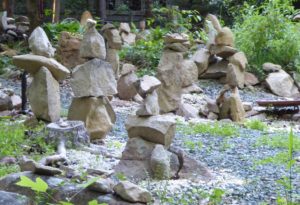
In the Stone Garden, poet and therapist Brian Stokes communes with dancing stones, exploring the delicate balance between living and not-living, while he lives, deeply, with cancer. In this interview Brian talks with me about the practices of Being, and Deep Listening, and Wonder.
BL: Brian, what tale or what fairytale are your emerging stone beings telling us?
Brian: They are telling us a tale of the human race that went off on its own and just did whatever it wanted to do with the world that it was a part of, as if that wasn’t true. The stone creatures are giving rich testimony that there is a beauty in the as-is-ness and the simplicity of nature. They’re singing a song of collaboration together and balance that human beings seem to have left behind a long time ago.
BL: Except a certain human being!
B: The creatures, the plants, they make enough with what they have. And that’s a song that they’re singing to us, yet I also feel them singing that to me: “Don’t worry about how much money you have; don’t worry about how long you’re going to live; don’t worry about how you’re going to take care of this or that issue; just come back, put your hands in the earth.”
BL: So the stone creatures have something to say about all of that.
B: Right, about balance and also about timelessness. The stones that I dig up, who knows how long they’ve been underground, likely hundreds of years, maybe even thousands, just because of the rocky nature of the land where I live, so it’s not like anybody could grow anything there. The stones have a presence and a vitality, so I know that ancient people, this is where they would come to warm themselves sitting on the rock, dry their skins, grind their acorns.
BL: The stones have witnessed it all.
B: Uh-huh. So the tale, another way I could say it is, I see them looking at me as a Western industrialized citizen and saying, “No doubt you’ve accomplished a lot of things, yet you’ve left too much behind, too much of the connection with the rest of us.” It’s beyond just saying this stone garden is beautiful. It’s a place of belonging. I belong there. It’s my family. I’m learning to listen there in the silence. This morning I was playing outside with two of my grandchildren, sharing that sense of wonder. So that’s the tale I’m passing on that I’m receiving from them, the joy of how the stones stay up through the rain, through the snow, improbably. They do that because they say, “I’ve found my place. I’m happy here.”
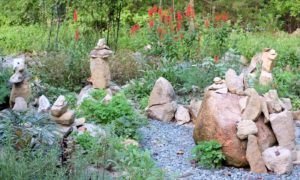
BL: The stones are providing little places for other kinds of critters, too.
B: Yes, you look at one of the stone creatures and you see how this little fledgling, hatchling fence lizard feels so secure, because it can just slip into a crack between two stones. The gratification I feel just being a midwife to these life forms, and also how I feel when I see how I create refuge for these animal beings. I feel like I’m doing it for myself, too, somehow, in a way I can’t really understand. Coming back to the tale, I feel the stone garden saying, “You Western man, you’ve lost your vision, you’re preoccupied by things that have their own value and importance. But you’ve lost the bigger picture. The things you’re doing you’d never do if you knew.”
BL: If you knew what?
B: My place, my real place.
BL: You say we wouldn’t do this if we knew our place. Can you say a little more about our place?
B: Our real place is to use our human capacity of consciousness to spend time freely just in stillness and in awe and wonder, the contemplation of it, let that really affect us. The primary human gift is to be able to have wonder at the rest of creation. And there’s something in that that brings us to fullness in that moment. Those moments when I’m so blessed to be just sitting here. It’s all here. Nothing is missing. It’s the direct experience of wonder that we try to create in so many secondary ways. Stories are wonderful. They’re beautiful, but if they don’t bring us to that basic sense of wonder they’re also a distraction.
BL: It seems like your stone beings are part of these life forms that keep reminding you of this.
B: They keep reminding me, especially the stone creatures. No matter how many times I see them I have amazement, disbelief. They say, “Remember you didn’t create us.” It’s not, look what I did, it’s look what I’m a small part of. I sense that’s where we are really out of balance. We don’t come back to that primary simplicity of our role in the web of things. Many of us go through life busy and relatively dissatisfied. We’re missing that role of the human being to bring wonder to what’s wondrous.
BL: It seems like that’s what’s been defined as the role of a mystic, and that was ok for that vocation. Some people have carved out that vocation for themselves, but you seem to be taking it further than that. You seem to be seeing that this is an aspect of our humanness, not a particular point of view or calling.
B: The mystic is keeping alive the experience that every human being is capable of asking, how can I bring wonder to the life around me where I am today? The cultivation of that, bringing wonder to life as it is, whether it is a beautiful spring day or cold rain, there’s something wondrous about them.
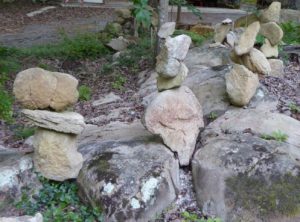
BL: You’re for being with it all.
B: Of course I have my preferences, too, and I see how they narrow my experience of life, and that’s part of the gift of my illness. How do I really want to spend my time? I just want to keep deepening the experience of wonder, because that is my gift to the life around me. We’re familiar with the real peak experiences. Night sky. Fall colors along the Blue Ridge Parkway, yet there is this little speck here on the table. [Brian zeroes in on a small, pulled thread sticking up from the woven tablecloth.] I’m not figuring out what it is, I’m saying, “Hello.” In saying hello there’s a quiet and stillness. It’s not like the little speck is saying anything to me that is transactional, yet what it’s done is it’s given me a gift of dissolving my distractions. The mind ruminates. It chews its cud. When I’m not in these moments of wonder I’m really having to be mindful, catch myself: Wow I’m having this conversation with this person in my head for the hundredth time trying to fix something. It’s not I need to stop that, it’s just realizing I’m going somewhere that’s not leading to anything. This. . .
BL: This speck, this consciousness. . .
B: Even poem writing. If the poem doesn’t reflect some aspect of this it doesn’t interest me. That’s what the poem does. It brings me back to, oh that’s what it was like. I’m feeling it. It’s a sufficiency of experience.
BL: To have that quality of attention, of communion. . .
B: Attention is just the preamble to communion. I bring my attention to the speck, and I say,”Hello, look at you!” It seems silly, my mind says, yet I can feel the deepening. What you and I have done is surrounded ourselves with countless little. . .
BL: Specks!
B: When I go to your haircap moss, it’s just like, “Look at you, wow, you’re just so full of yourself. Let me have some of that sense of pure beingness.” It is enough. . .
BL: As it is.
B: That’s part of the tale. This is where happiness is.
BL: Freedom.
B: Freedom, yes that’s right. I don’t know that any other creature struggles to feel free that isn’t in a cage of human making. [We laugh at the thought of asking the birds outside if they feel free!] a very round-about response to your prompt.
BL: No, it’s lovely. I like that you just took that speck. . . you could have criticized it, and then we would have been distracted by all sorts of other things. You whittled it down to not seeing it as a flaw.
B: Someone might say, “Do you have a pair of scissors?”
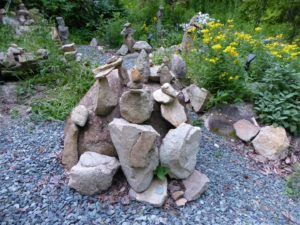
BL: It’s one thing to see this speck as is, just being here. But with your stone creatures, there seems to be an animation, as if this speck here comes to life, and then there’s a communing back and forth that’s fascinating.
B: I’m thinking of Bill Moyers interviewing Joseph Campbell: “So, myth is about meaning.” “No, myth is about experiencing.” This speck is a little myth. Now, the stone creatures, I have much more engagement with them. I dug them out of the ground. It can take a week of getting the stone out.
BL: And at that point you have no idea what’s there, just that something wants to emerge.
B: Yes, it’s calling me. There are two that I’ve never been able to get out. I’m not using my will to get them out no matter what. I’m just doing my part, and it’s also up to the stone, too. Does it want to come out or not? So I’m already humbling myself back to the scheme of things. I’m not here to capture the stone. I’m here to see what the stone wants to do. The first thing I do is hose them off, and they show themselves to me, and they say, “Look at this curve here.” And I’m like, “Wow, that’s amazing, look at you! What do you want to do?” They say, “I want to dance, stand me up.” In the beginning it was, like, imposing will: I want to make something I can be proud of. I want to amaze people.
BL: I want to be a Stone Balancer.
B: They fall over. There’s nothing but a stack of stones, so what. Taking each stone and saying show me what you want. The stone will tell me when it’s still and happy, and I’ll say, “Well, you want something on top of you?” “Yes?” “Ok, let’s try.” But if it changes its mind. . . I have some where there’s just one stone standing. I’m like, “Who’s gonna be impressed with that?” The stone says, “This is great.”
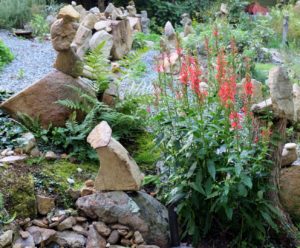
BL: So the stones speak to you. And they listen, too?
B: Every time I go out there I hear them listening to me. There’s that story about Mother Theresa. You know she’s a complicated person, a real human being, so she’s entitled to complexity. A journalist was interviewing her. He was going to get a real story. “Mother Theresa, when you pray to God what do you say?” “I don’t say anything. I just listen.” “So when you listen, what does God say?” “God doesn’t say anything, God just listens.” That’s the communion. It’s at a deeper level than our thoughts, our words, our requests. They’re bringing me into their peace. Sometimes I will talk to them. I say, “I can’t believe you guys, you’re amazing.” The rest of my life could be in the toilet, and I just feel so full of having lived, just being here. These moments of communion when nothing is missing. There’s all sorts of rigorous meditation, ritual. What you and I know is that the direct experience is right here in the sanctuary. I want to go find a certain plant and look at it, see how it’s doing. I’ll just look at it! I’ve already seen anything that cognition was looking for, but I haven’t had the real seeing, so I just wait for that ineffable communion between myself and the plant.
BL: Do you want to say anything else about how you go out in the morning and the stones listen or speak to you?
B: The way the poet can say it is this: when I go out there, I’m the only one standing still. Everything else is moving, because it’s in direct experience of life. It’s really astonishing how stones are so animate. There’s a fullness in their self-presence. We pick them up and they’re heavy, because they have presence. I had a message from the stones when I was first getting started. “Wow, you guys are really alive aren’t you!” They said, “We’re glad you can see that. Many of you humans don’t realize this about us, because our pulse is once every thousand years.” That really hit me, that’s so different from our 60-70. We don’t give anything credit for being alive unless its life is similar to ours. Yeah, the birds are alive, but what about that cedar panel there on the wall? You could say it was once alive when the tree was growing. But it’s alive the way this speck is alive. It’s creating space every day.
BL: Yes, come to think of it, that wood panel is doing a lot of different things for us.
B: The bricks on that wall are alive. They came out of the earth. They went through the fire. Someone might ask, “Well Brian, how do you know that?” Because if you sit here long enough they’ll speak. Everything speaks.
BL: Let’s listen. [We sit in silence.]
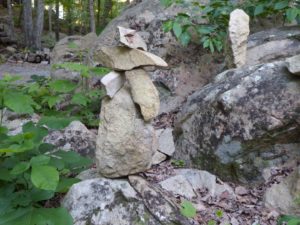 B: You’re helping me. If I sit here long enough I hear the example they’re setting for me of just being what they are, versus my thoughts of what I’ll never be that take me out of the direct experience of life. The whole world is animate.
B: You’re helping me. If I sit here long enough I hear the example they’re setting for me of just being what they are, versus my thoughts of what I’ll never be that take me out of the direct experience of life. The whole world is animate.
BL: Every one of them, profound being. I want to read you something from David Abram in an interview with Sharon Blackie that made me think of you: “The person on the edge holds together the human world and the other species, being very vulnerable to communications. They don’t identify their primary work as healing. Their healing grows out of their ability that keeps the human world and more than human world in balance, in equilibrium. In every species there are the porous ones, the porous boundary keepers. They are shape shifters, a cross-species. They are uncommonly canny. And also there are intermediaries, like fairies in land-based cultures, or beings that are halfway between a rock and a human when a human is drawn to a rock and a rock is drawn to a human.”
B: I feel tears close by, because I have put aside that feeling that I’m crazy for being the way I am. There’s a recognition here that this is a valid human state rather than an idiosyncrasy. And a valid role to be playing, this person on the edge, this person that’s an intermediary. And I love this part. . . beings halfway between a rock and a human. . . so then there’s some halfway being formed.
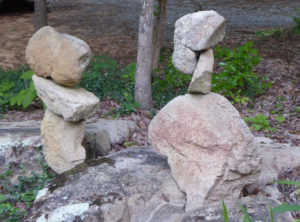
BL: I want to know something about the very beginnings. You wanted the stones to stand. You had an idea. When did you first discover that there was a different thing wanting to happen?
B: It didn’t take long because the tension of trying to do it from my will. . . Something would arise, and I’d feel, don’t fall. I felt the separation rather than a communion. After a few weeks I could see, well control is not going to work. Something said, Slow down, don’t think about what you’re doing, let your fingers commune with the stone. Take your time. It doesn’t matter how long you’re just moving it this way or that. There’s no destination here. Suddenly there’s a second stone that’s improbably on the first and my fingers are checking it out: Wow that’s solid, that’s what the stones want. It got me off the hook!! I dig them up. They say, “Wash me off, I want to dance. I’ve been in the ground a long time.” You don’t think of stones dancing. We think of branches dancing in the wind. The stones are dancing in their mudra, whatever their posture is.
BL: They have a grace.
B: They know they’re dancing, and I can feel that, so that when I look at them they’re moving like that flower I told you about moving when the air was still. Someone could say, “Now, did you really see it moving?” What’s most real is magic.
BL: David Abram is a magician.
B: Is he? Oh interesting. Yes, ordinary magic. The birds at the bird feeder — there’s a direct experience of life that the rest of creation has, that humans have to struggle to keep coming back to. Even those of us who drink the communion elixir so freely get distracted. I could go on to the next thing on my list or I could just sit here. Now time stops. That’s the reward that comes with just going outside and standing there.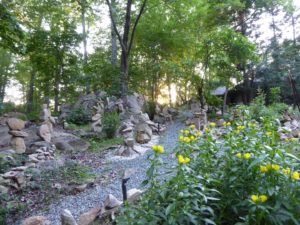
BL: Yes, time stops.
B: What I notice is that in most of my life of creating things there’d be a long sustained burst of energy, and I wouldn’t stop until I was finished. Now I just pause, and I might not come back to it for a week, a year. I hear a voice saying, Just stop and look around. How connected do you feel? If I have to ask if it’s any good, I’ve lost my communion with it, the sign that communion is taking place. Of course I see and honor your moss and quartz spiral, but what I’m really seeing is BL communing. You don’t know how it’s going to turn out.
BL: And then more quartz emerges that wants to be there, too. . .
BL: We were talking about the life forms, the creatures, and the stories they might be telling us, the songs they might be singing. And I’m just wondering what larger mythopoetic story you glimpse that you might be living?
B: The way I hear your question is. . . It’s about my early struggles in life that left me separated from my real self. There’s some ongoing healing of the part of me that feels like a failure, damaged in some fatal way. There’s a healing of that wound in being the doula for the Stone Garden. I’m part of Beauty. Grace. The physical journey with my illness is inviting me in real time to just go outside for a few minutes, even if I can’t do the physical work. That’s quite enough. The tale they’re telling is, “If we’re enough, you’re enough.” I don’t modify them in any way to make them fit, because there’s an integrity in this stone. Not the plastic surgery of beautification by will. It’s what the stone wants along with what I want. There’s a negotiation.
BL: What medicine story about the delicate balance are you telling us through your stones?
B: Something about our struggle to feel our real part in the web of creation. With stones, especially, it’s so easy to marginalize them, objectify them. Oh yeah, they’re just stones, building material, could make a nice garden bed with them. The medicine is that they are not only something animate and alive, there’s an even deeper mystery. We are a part of them and they are part of us, like our own bones really. They look like they’re out there. Yet, they’re not just an extension of ourselves. It’s not just a connection. In our limited kind of division we tend to separate things. But the medicine is: I am the squirrel, I am the stone, I am the bird, the bird is me. Not just as a thought form, the momentary experience of that. The stone being I’m looking at right now, it’s just as real, full of life and feeling and experience as you are to me.
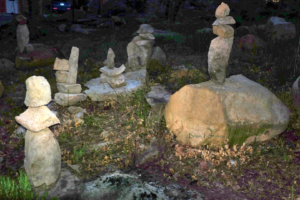
BL: To see, to experience like that is really a gift.
B: The big ones rarely fall down, but two did get knocked over a week or so ago — by deer, I assume, since they were together. Initially I felt some dismay, and I also noticed a calm, like nothing has been destroyed. Before, I would have thought I need to put them back as soon as possible. I could feel my striving. But now I just left the stones where they are. I picked them up, felt them, and put them back down. It’s like really feeling that nothing has been destroyed. There will be some new expression that will come on its own. It won’t be me trying to put it back the way it was. Although, if that’s what wants to happen, ok. If something else wants to happen, ok. What I’m enjoying is this newfound freedom. It’s like I’ve healed a wound in me that it has to be something I can show somebody for me to feel the value of it.
BL: And for you to feel valuable yourself.
B: Right. It’s something new, some letting go of that. So when I see the stones lying on the ground I feel a pleasure. They’re beautiful. They’re beautiful right there.
BL: They can just lie there disheveled, disorganized. They’re ok.
B: Which are all just my projections, that they’re disorganized. They look at me and they go, “Excuse me! What did you call us? You have no idea.”
BL: “We’re just lying here.”
B: “We’re taking a break.”
BL: “Feels kinda good.”
B: “And let me tell you, that deer really was surprised when we came down!”
BL: So, Brian, the delicate balance that we’ve talked about is between life and death?
B: It’s between living and not-living, in the moment.
I Have A Woodland Garden
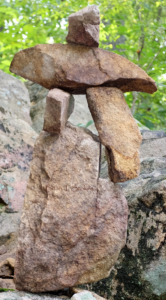
I have a woodland garden
they call it
It’s where you pretend
to keep the Forest out
somewhat not mostly,
as it just finds
a thousand other ways
to dig in
Endless
and clock-busting
cultivation
knees on the breast of Earth
fingers like a surgeon’s
tunneling
feeling for that broken off root
and therein lies the Peace
I surrender
my own weeds
one at a time
as I pull and wrestle out of ground
the one before me.
And then Time stops
for a sweet Moment
Depths of Kindness
given and returned
— Brian T. Stokes
Text and photos (C) 2020 Betty Lou Chaika. Captioned photos (C) 2020 Brian T. Stokes.
You can find Brian here: https://www.facebook.com/brian.t.stokes
You can find Brian’s Stone Garden here: https://www.facebook.com/CarrboroChaparral/
If you’d like to read more Earth Sanctuaries stories about the healing power of stones see The Farmer Fairy’s Stone and A Magical Stone, A Healing Chant
Susan Thesenga
This is so wonderful. Moves me beyond words. What a relief to be called to this holy wordless presence.
Betty Lou Chaika
Susan, thanks for your warm response. I have gone to your website. Your work looks amazingly beautiful!
Brian T Stokes
Much of this I learned at your knee, Susan Thesenga. And your ongoing invitation and encouragement to find and nurture my real self.
sharon blessum
truly lovely…i am a lover of stone people also…
Betty Lou Chaika
Yes, Sharon, this story is all about love — of stones and of Life!
Eve Olive
Stones lifted into life and given a voice…if one can be still enough to hear…enchanting…thank you both.
Betty Lou Chaika
Eve, I am charmed to imagine the dancer in you dancing among the dancing stones, responding to their whisperings.
Dana Brinson
Thank you for this beautiful interview and the delightful photos! What a lovely meditation on being in relationship with the land and stone people. Thank you to you and Brian for sharing!
Betty Lou Chaika
Hi Dana, yes, you really get the message: it’s about one person’s experience of being in deep relationship with the land on/in which he lives and relating deeply with the rocky nature of that land. The stone beings that emerge become his teachers.
Ricard Knox
I’m feeling so proud of my boy Brian, I feel proud and close and tender and with still appreciation and quiet joy…Thank you for this article…HooRay !!!
Betty Lou Chaika
Ricard, you are very welcome. Collaborating on this interview project with Brian was such a pleasure. Thank you for your open-hearted respnse.
Sandra Brooks-Mathers
What a revelatory delight to have read this playful, sparkling interview aloud with my husband Mike! Thank you so much, dear Betty Lou, for bringing dear Brian’s voice and sensitive love for stones to us! I love hearing/reading you two mystics talking and experiencing stone-love, nature-love together. Much love from me to both of you.
Betty Lou Chaika
Sandra, I love that you and your husband read it together out loud! Now you’ve got me having fun imagining you playing me and Mike playing Brian, as if actors doing a reading of a little two-person play called Two Mystics Talk About Stones. Ha! Thanks for bringing some love and lightness into my day.
Shannon Crane
Ahhh, how refreshing. Thank you for this gift. <3
Betty Lou Chaika
Yes, Shannon, Brian gives us all a gift in sharing his wisdom. I’m grateful too!
Kathleen Hannan
Thanks so much Betty Lou and Brian. I am in my bed in the cold log cabin and while reading your words and seeing the beautiful pictures of the stone beings I find that I am with you in the sun of an afternoon, in love with the way things are. And finishing reading I look up at my chimney and see that the old bricks and mortar are alive too. Settled and settling, in motion and resting. Gratefully, K
Brian T Stokes
Kathleen, it moves me so that you share this Present Moment so palpably and hear the chorus of bricks and mortar as they warm you with their Presence. “Settled and settling, in motion and resting.” I take in the poet in you that sings her experience. I am infused.
Betty Lou Chaika
Watch out, Brian, wonderful song writer that Kathleen is, she just might turn this experiencing into a song!
Betty Lou Chaika
Thank you, Kathleen, for joining us. I’m not surprised that you would resonate with Brian’s sense-ability. As teachers you share many wisdom teachings on listening, direct experiencing, communion, being with what-is. . . I’m grateful to you both.
Brian T Stokes
This recalls for me what David Abraham said above, and what you bring to each and every one of your posts:
Roszak called “the Old Gnosis,” or—more revealingly—“sacramental consciousness” — “the old way of knowing, which delighted in finding the sacred in the profane,” and which encountered the “really real” through “a visionary style of knowledge, not a theological one.”
“Its proper language is myth and ritual; its foundation is rapture, not faith and doctrine; and its experience of nature is one of living communion,” he wrote. Unlike the scientist, the technician, or the capitalist, the avatars of sacramental consciousness—the shaman, the magus, the oracle, the sibyl, the prophet, the poet, or the artist—not only hope but “know that there is more to be seen of reality than the waking eye sees.”
Betty Lou Chaika
Brian, you well understand my passionate desire to commune with and ritually celebrate the unseen spiritual Reality that pervades the sacred reality of our visible living world. I am grateful that we share this “sacramental consciousness,” that is so beautifully expressed in this interview.
Dan iott
Oh! how the talk of rapture beyond faith brings a tingling to my being – may I be uncovered and washed and danced within it. Thank you Brian and Betty Lou for this beautiful meditation.
Betty Lou Chaika
Dan, you’re welcome! Thank you for responding with your whole body and soul to Brian’s meditation on being.
Brian T Stokes
Let’s act as if you’ll be here one day soon, Dan!
You’re such a Mystical Bear!
Brian T Stokes
“What we’re seeking is an experience of being alive…So we actually feel the rapture of being alive.”
Joseph Campbell
https://www.youtube.com/watch?v=na5MDHf2X_M
Betty Lou Chaika
Thanks, Brian. This is a wonderful two minute interview of Joseph Campbell by Bill Moyers. It’s good to actually see and hear Campbell saying these words.
David
Brian, I am glad to have had the opportunity to visit with you at your Stone Garden and walk among your amazing stone beings.
Betty Lou Chaika
Yes, David, what a magical evening that was, with the orange sun setting behind the stone persons, and them quieting down, getting still, preparing to sleep for the night.
Brian T Stokes
It was our first time together in the Stonegarden David. starting in late afternoon. And then when it dawned on me you were going to stay through twilight into dark I realized I was with some kindred spirits.
A still glowing and pulsing moment for me!
ann loomis
Seems as though we’re between a rock and a hard place with this coronavirus. We’d all probably like to live under a rock for the duration. I like your foray into writing an active imagination dialogue with the stones, as they hold much wisdom for our human condition.
Betty Lou Chaika
Ann, I like your rock metaphors for the Coronavirus situation. Yes, Brian’s ongoing imaginal dialogue with his stone beings is full of compassion and wisdom!
Carl Barringer
Well this is delightful! Deep and alive. As with so many other “communions” with you Brian. Thank you. Sure would love to walk and sit in your garden someday 🙂
Brian T Stokes
Let’s envision that being together in The Stonegarden, Carl! You and me and your big heart!